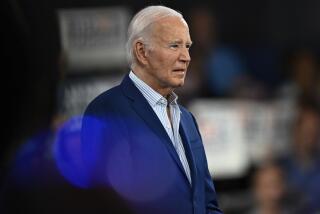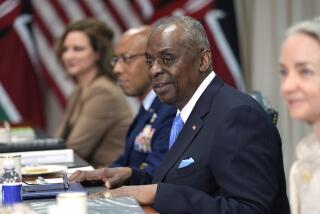For Robert Gates, caring for troops was job No. 1
When Defense Secretary Robert M. Gates leaves the Pentagon every evening, he carries home a sheaf of documents about the latest American soldiers killed in Afghanistan and Iraq. After dinner, usually alone, he takes out a pen and writes notes to the families of the fallen.
And most nights, he weeps.
He has signed about 3,400 condolence letters since taking over the Pentagon in late 2006, aides say. “There’s probably not a day in the last four years that I haven’t wept, and it’s mostly when I’m doing those letters,” Gates said in an interview.
As Gates prepares to retire at the end of June, the toll on his psyche after serving as a wartime Defense secretary during two bloody conflicts spanning two administrations seems more and more visible.
Other than Robert McNamara, who headed the Pentagon during the early years of the Vietnam War and left office a broken man, perhaps no other Defense secretary in the last half-century has seemed more affected by the hard task of sending American soldiers into combat than Gates.
He often chokes up when he is talking to troops on his frequent visits to war zones, a rare show of emotion from a normally reserved and unflappable former intelligence analyst.
On trips to Walter Reed Army Medical Center in Washington, he hands wounded soldiers his business card with “Call me if you need me” scribbled on the back, along with his initials. “I love you,” a bleary-eyed Gates told a group of soldiers, whose unit had suffered severe casualties, at Forward Operating Base Joyce in eastern Afghanistan in December.
Gates’ concern for the troops is a key part of his legacy as he leaves office.
He has pushed the lumbering Pentagon bureaucracy to turn out new armored vehicles and other equipment to keep soldiers safer in combat and to get them treatment faster when they are wounded.
And he has become a voice of caution and even outright opposition to committing American forces to new wars. Gates publicly questioned the need to join the NATO air war in Libya, arguing that the military already was overstretched in Afghanistan and Iraq. Since then, he has sought to limit the U.S. role.
Gates emphasizes that he would not hesitate to support sending troops to another conflict if national security were threatened, and he favors only “modest” reductions in troop levels in Afghanistan in coming months. That puts him at odds with some in the Obama administration who want to bring U.S. troops out sooner.
But the longer he is in office, Gates said, the “heavier” the burden he bears when he is asked to make decisions that inevitably involve sending more American troops to their deaths.
“I’ve got a military that’s exhausted,” he said. “Let’s just finish the wars we’re in and keep focused on that instead of signing up for other wars of choice.”
He was interviewed last week in a specially outfitted Air Force C-17 on his way home from his last overseas trip as Pentagon chief. During four days in Afghanistan, Gates said goodbye to U.S. troops at remote outposts, including several where combat has been especially intense during the last year.
At each stop, almost the same scene unfolded: Surrounded by camouflaged soldiers or Marines in sweltering heat, Gates, wearing khakis and a baseball cap, pulled a piece of paper from his pocket, glanced at it, and spoke in a low and halting voice, as if the words came hard but from his heart.
“Probably more than anybody except the president, I am responsible for you being here,” he told about 300 troops from the 101st Airborne Division at Forward Operating Base Sharana, a desolate Army outpost near the Pakistani border. “I’m the guy that signed the deployment orders that sent you here, and that has weighed on me every day that I have had this job.”
Among those in the audience was Sgt. Chris Carbone, who received a Bronze Star for bravery from Gates for helping recover the body of another soldier, Staff Sgt. Kenneth McAninch, who was killed in October a few miles from FOB Sharana.
“I wasn’t expecting it, and it’s an honor,” Carbone said after Gates pinned the medal on his chest.
Carbone was on patrol when a buried bomb exploded beneath one of their combat vehicles, a hulking armored truck with a V-shaped bottom built to withstand all but the most powerful detonations. Protected inside their vehicles, everyone in Carbone’s squad survived the blast, but McAninch was killed when insurgents opened fire on soldiers caught in the open as they tried to tow away the damaged vehicle.
McAninch’s widow, Shawnna, and his mother, Cheryl Nance of Peru, Ind., each received handwritten letters from Gates. In her letter, the mother recalled, Gates wrote that he was “sorry for my loss and that he was a hero in their eyes, and I should be very, very proud of my son. That really touched me.”
In 2009, after a gunman killed 13 people at Ft. Hood, Texas, Gates flew without telling the news media to a small town in Tennessee to attend the funeral of one of the victims, Army Spc. Fred Greene, after the soldier’s stepfather called the Pentagon and invited him.
Gates attends soldiers’ funerals regularly at Arlington National Cemetery outside Washington, but this was the first time he had traveled away from the Washington area for a burial service. He sat alone behind Greene’s family at the hillside cemetery and made no public remarks. Greene’s stepfather, Rob Nourse, said Gates, a father of two, mentioned that his own son was the same age as Greene, who was 29 when he was killed.
“They asked me to come, and I said, “Let’s do this,’ ” Gates said, recalling the cold, rainy afternoon. “It was one of those things you read about all the time.” On the drive from the airport, “there were flags out everywhere” and “marquees on the fast-food restaurants and businesses” in memory of the slain soldier.
When President George W. Bush chose Gates to replace Donald H. Rumsfeld at the Pentagon, Gates’ connection to the military had been confined to a few years as an intelligence analyst in the Air Force, and weekly lunches at the Pentagon during his years as head of the CIA from 1991 to 1993.
Rumsfeld came under sharp criticism for sending condolence letters that were signed by automatic pen — a practice he stopped after an outraged family member complained to a member of Congress and it came out in a hearing — and for sending the Army to war in Iraq without enough armored vehicles or other protective gear.
When Gates arrived at the Pentagon, the changes were immediate.
After reading about the Pentagon bureaucracy’s reluctance to buy “mine-resistant ambush-protected” vehicles, or MRAPs, in a USA Today article in 2007, Gates funneled billions of dollars into ramping up production. His goal: to get as many of the armored vehicles to units in Afghanistan and Iraq as soon as possible.
“I follow this pretty closely,” Gates told troops at Forward Operating Base Dwyer outside Kandahar early this month, noting that there were precisely 7,081 MRAPs in Afghanistan that day.
Gates also has pressed the military to speed up response times for helicopter medevac units after he learned in 2008 that it took an average of nearly two hours to transport wounded troops to a field hospital in Afghanistan but less than an hour in Iraq.
Pentagon officials responsible for troop care told him that it was the quality of the treatment, not the medevac response times, that was key in saving the wounded.
“The truth of the matters is, statistically, they may have been right,” Gates said. But “if I’ve been shot or blown up, I want somebody there as fast as possible.”
Even after he ordered three additional Army field hospitals and another helicopter unit to Afghanistan, it still took eight months to get the response time down under an hour. It continued to improve, and helicopters now rush the injured to hospitals in 40 minutes.
Before the emergency response times were cut in half, Gates was told, no soldier who had lost two limbs in a roadside bomb attack in Afghanistan had survived.
“They do it all the time now,” he said.
Gates said he can’t explain his emotional bond with the troops, but he credits his parents, his boyhood experience as an Eagle Scout and his time as president of Texas A&M University, which produces more military officers than any school other than the military’s service academies.
“The only thing that actually matters to me long-term is if somehow these kids think that here was a secretary of Defense that was really looking after me,” he said.
“All the stuff, the budget decisions, the war decisions, all that other stuff, the only one that I care about is what those kids think of me. The rest of it is just Washington talk.”
More to Read
Sign up for Essential California
The most important California stories and recommendations in your inbox every morning.
You may occasionally receive promotional content from the Los Angeles Times.










